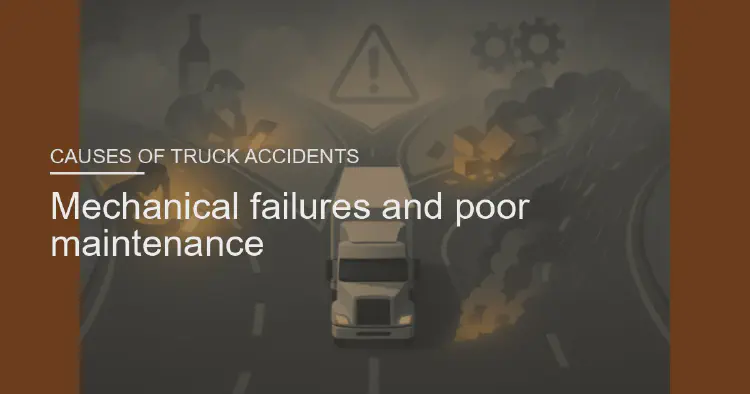Mechanical failures and poor maintenance
Commercial trucks are complex machines that require constant upkeep. Mechanical failures caused by poor maintenance are a major factor in many serious truck accidents, often making them preventable events.
- Truck Accident Law Team
- 2 min read
Article 5 of 6 in Causes of Truck Accidents/

Mechanical Failures and Poor Maintenance as a Cause of Truck Accidents
Common Mechanical Failures
-
Brake Failures
- Trucks rely on air brake systems that require frequent inspection.
- Brake defects are among the most cited violations in FMCSA roadside inspections.
-
Tire Blowouts
- Worn or improperly inflated tires can burst, causing loss of control.
- Blowouts may scatter debris that endangers other vehicles.
-
Steering and Suspension Issues
- Faulty steering components reduce maneuverability.
- Worn suspension parts can cause instability and rollovers.
-
Lighting and Signal Defects
- Broken headlights or brake lights reduce visibility and increase crash risks.
- Electrical failures may also affect trailer connections.
-
Engine and Transmission Failures
- Sudden breakdowns on highways create hazards.
- Leaks and overheating can cause fires or road obstructions.
Causes of Poor Maintenance
- Negligence by trucking companies cutting costs on repairs.
- Failure to follow FMCSA maintenance standards and inspection requirements.
- Improper record-keeping or falsified maintenance logs.
- Pressure on drivers to keep vehicles on the road despite known defects.
Federal Requirements
- FMCSA regulations mandate:
- Daily inspections by drivers (Driver Vehicle Inspection Reports – DVIRs).
- Systematic repair programs by carriers.
- Annual DOT inspections by certified inspectors.
- Records of inspections and repairs must be retained and available for review.
Legal Implications
- Mechanical failure linked to ignored maintenance obligations can establish negligence per se.
- Liability may extend to:
- The trucking company for failing to maintain its fleet.
- Maintenance contractors if repairs were performed improperly.
- Manufacturers if defective parts caused the failure.
- Maintenance logs, inspection reports, and expert mechanical testimony are often central evidence in litigation.
Summary: Mechanical failures in trucks often stem from poor maintenance and neglect, rather than unavoidable mishaps. By enforcing strict maintenance requirements, regulators aim to prevent accidents that can otherwise lead to catastrophic outcomes on U.S. highways.
You might also like:
- Tags:
- Trucking Companies
- Truck Accidents
- Trucking Company
- Maintenance Logs
- Mechanical Failures
- Poor Maintenance
- Fmcsa Regulations
- Inspection Reports
- Establish Negligence
- Cause Truck
- Legal Implications
- Evidence Litigation
- Defective Parts
- Liability Extend
- Maintenance Contractors
- Litigation Summary
- Inspection Requirements
- Violations Fmcsa
- Cause Truck Accidents
- Driver Vehicle Inspection
- Inspection Reports Dvirs
- Vehicle Inspection Reports
- Maintenance Logs Inspection
- Manufacturers Defective Parts
- Negligence Trucking Companies
- Annual Dot Inspections
- Mechanical Failures Brake
- Maintenance Logs Pressure
- Evidence Litigation Summary
- Logs Inspection Reports